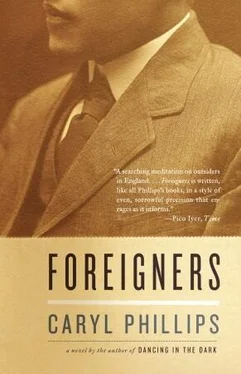'Mrs Barber, first I wish to thank you for agreeing to see me today. I know that you are busy with matters relating to your schoolhouse and I also understand that you must be grieving over your recent loss. However, I wish to write a small profile for the Gentlemen's Magazine concerning your late husband and the unique position that he occupied from which he was able to witness the birth of some of our finest literature. I was, of course, hoping to speak with him directly, but this being impossible I thank you most sincerely for granting me an audience. I will endeavour to occupy only a small portion of your morning.'
The woman looked quizzically upon me, but she chose to say nothing. For my part I was surprised to see how much of an inroad nature had made into her complexion for, sad to say, she was pockmarked extensively, and her grey hair hung lank about her ears. This was not the woman that I had expected to encounter, but the elements have a way of destroying even the most beautiful objects in nature, and sadly it appeared that Mrs Barber had been quite brutally exposed to the vicissitudes of rain and shine for many years now.
'Does it trouble you my daughter being present?' She spoke quietly, but before I could answer, she continued. 'I can send her out if it will please you.' I smiled, first upon her and then in the direction of the mongrel.
'It matters little to me, Mrs Barber. As I said, I have no desire to disturb your day more than is strictly necessary.'
The common woman looked at me in a strange manner, and for a moment I imagined her to be perhaps impaired in her faculties. She began to grin, somewhat toothlessly, and I found myself trying to imagine this Betsy in her full glory a quarter of a century earlier when all of London was animated by the news of the scandalous developments in the great lexicographer's household.
In 1776, Francis announced to his master that he was somewhat persecuted by love and that he had discovered the girl to whom he wished to be married. Initially, Dr Johnson wondered if the lucky girl was with child, but he deemed it politic not to enquire. He knew of Francis' popularity with a variety of young females, and although he regarded the sable young man with paternal concern, he was reluctant to begin lecturing the negro on any aspect of his behaviour in case Francis felt pressured into once again absconding to sea. Dr Johnson asked Francis if he might meet with his bride-to-be, and Francis said that he would bring the girl to him at his master's earliest convenience. Francis also suggested that in order to avoid further conflict with Miss Williams, he would prefer it if after their marriage he and his wife might be permitted to establish lodgings outside of Dr Johnson's house. After all, in addition to Miss Williams there was also her Scotch maid, and the gloomy widow, Mrs Jesmoulins, and her recently arrived daughter, so his master would not be short of assistance. Francis made it clear that he intended to continue to serve his master, but in the interests of peace and harmony he seemed to have already made up his mind that this would be the most sensible course of action.
Two days later, Francis arrived at the house with a freshfaced, twenty-year-old English girl in tow, her arm linked nervously through his own. He introduced the girl to Dr Johnson as Elizabeth, and she curtseyed gracefully, but then Francis immediately began referring to her as Betsy, which his master took as his cue to do the same. The older man inspected the young girl, who seemed slight of body but possessed of a natural bloom, and he then asked after her family, and requested intelligence of how it had come to pass that she had met his Francis. He listened to her shy and cautious words, and then he delicately asked if the couple had any immediate plans for a family, at which point the girl blushed a deep crimson. Again, it occurred to the doctor that the wench might already be with child, for he knew full well that Francis' adventures in the world of passion were extensive and freely reported. Apparently some women, particularly those among the lower orders, found his ebony complexion appealing, and he saw no reason why this Betsy should be any different from the others. However, anything short of a direct question was not going to resolve his private speculation, and knowing that it would be impertinent to pose the question the doctor resigned himself to ignorance. After all, nature would soon enough provide him with an answer.
For her part, Betsy looked upon the famous Dr Johnson and wondered just what services her soon-to-be husband provided for this dishevelled man, whose wig had clearly seldom been combed and whose clothes looked dusty and unwashed. She had heard from many who had witnessed the gentleman roaming abroad at all hours of the day and night, that the man appeared to be insensible to his squalid appearance, but nothing had prepared her for this degree of slovenliness. However, he seemed to be a kind man, and he habitually referred to her Frank as 'my boy' in a manner that was affectionate enough for there to be no doubt in her mind how fondly he regarded Frank. And then later, but during this same visit, Betsy came to understand why her husband-to-be had insisted that they find their own place of abode outside of Dr Johnson's residence. Miss Williams, upon being introduced to Francis' intended, simply snorted in disgust and turned on her heels, which prompted neither comment nor admonition from the head of the household. As far as Betsy was able to discern, this blind woman, who apparently knew her way about the house with a confidence and ease that most sighted people lacked, clearly considered herself to be the queen of the establishment, and she made no secret of her contempt for Frank. Her husband-to-be had already informed her that she liked nothing better than to rail against him, calling him 'this supposed scholar!', and now Betsy saw for herself the truth of the situation. It was not until the ill-tempered Miss Williams left the room that she once again relaxed and felt able to breathe freely.
On the day of her wedding, Betsy made an extra effort to appear alluring, and to those gathered at the church she presented a splendid sight. Dr Johnson had seen to it that all the arrangements were to the liking of Francis and his wife and, as one might expect, the list of invitees comprised of those occupying both elevated and lowly stations in society. Guests were encouraged to mingle and, although this experiment was not entirely successful, most enjoyed a tolerable event, although there were some among the invited who had come principally to gawp and speculate at the propriety of this aberrant union. For his part, Dr Johnson looked upon the match as well made, but inwardly he worried with regard to the purity of young Betsy and her loyalty to his 'boy'.
It came about that the doctor soon had reason to be concerned, for not long after the wedding, at a party given by his friends the Thrales in their Streatham home, a party to which Francis and his new wife were cordially and generously invited, some of the male servants began to flirt openly with Betsy Barber. Perhaps unwisely, the newly wed 'lass' chose to do nothing to deflect the attentions of these men, and in a rage Francis flew from the house and determined that he would walk back to London by himself. Dr Johnson noted his servant's rapid departure, and when Mrs Thrale informed him that jealousy was the cause of Francis' anger the news appeared to somewhat exasperate the doctor. Later that same evening, while riding his carriage back to London, Dr Johnson came across Francis walking rapidly and with fury still apparent on his begrimed face. 'Are you jealous of your wife?' bellowed a disembodied voice. Francis stopped dead in his tracks not knowing exactly what was happening. He wondered if he was the victim of an attempted robbery, but he soon recognised both the person and the stern voice. His master did not give him time to answer and he asked Francis if the Thrales' footmen had kissed his wife in his presence.
Читать дальше











![Unknown - [Carly Phillips] The Bachelor (The Chandler Brothe(Bookos.org) (1)](/books/174132/unknown-carly-phillips-the-bachelor-the-chandle-thumb.webp)
